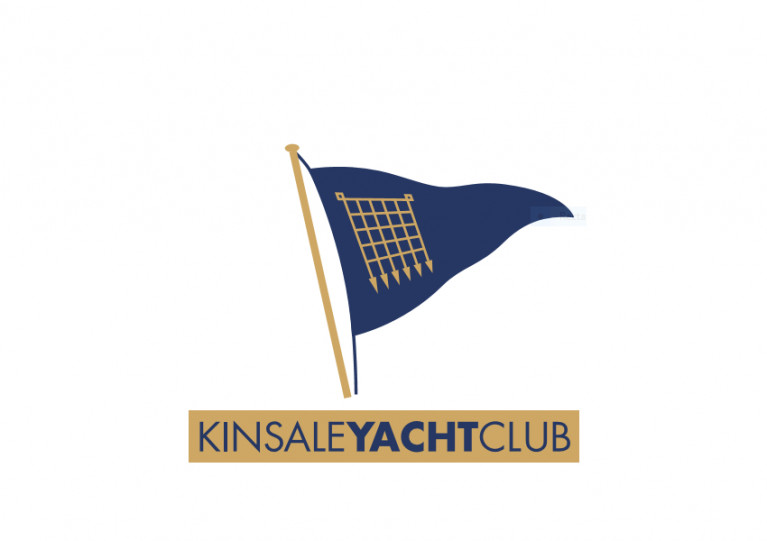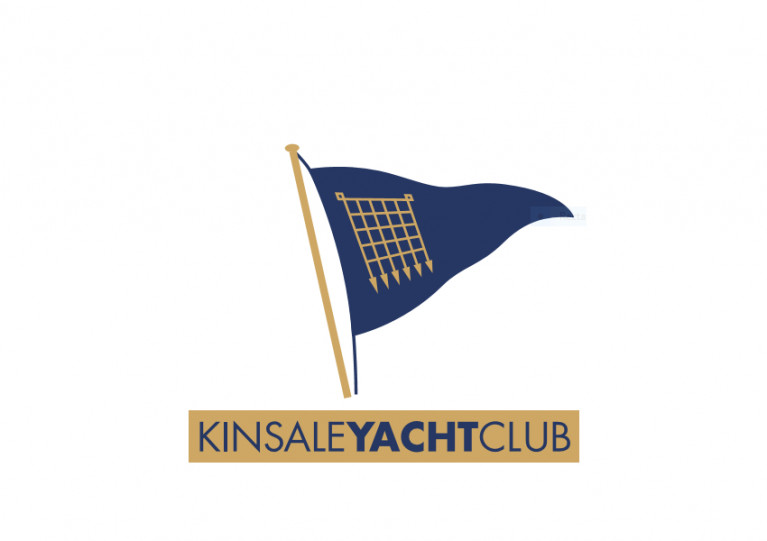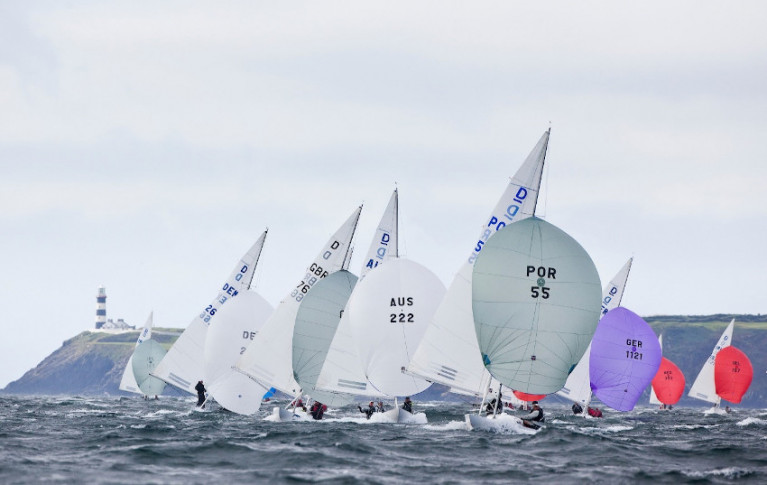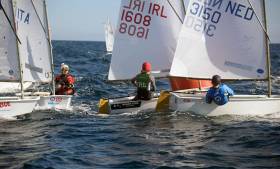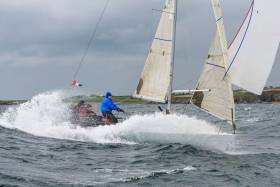Displaying items by tag: KYC
Kinsale Yacht Club Presents 2023 Season Awards at Laying Up Supper
Kinsale Yacht Club held their Laying Up Supper for the 2023 season in the clubhouse on Friday night (3 November).
Commodore Matthias Hellstern welcomed Irish Sailing president John Twomey and Julian Renault, Cork County Council senior harbour master, before the awards from the season were announced by Tony Scannell, the club’s Vice Commodore.
Club Person of the Year was awarded to Patrick Beckett, club treasurer and company secretary, for his enormous contribution to Kinsale Yacht Club on a daily basis.
Other prize-winners on the night were James and Harvey Matthew (Squib Class Boat of the Year); Cameron Good, Simon Furney and Henry Kingston (Dragon Class BOTY); Freya Conor Doyle and crew (International BOTY); Apache’s Alan Mulcahy and crew (White Sails) who were also winners in the Royal Cork’s Autumn League; Valfreya David Riome and crew (White Sails); Saoirse Richard Hanley and crew (Cruiser Spinnaker Class); and Swift’s Paul Cotter and crew (Cruiser Spinnaker Class).
Kinsale Yacht Club advises members that next Monday 24 April, LCF Marine Services will be on site to add new support piles to the marina access walkway.
Working from a barge, they will be driving new tubular steel piles and also carry out cutting and welding of brackets and new cross beams.
This work will commence at 8am on Monday 24 and will be completed by 6pm on Friday 28 April.
During this time period, there will be no access to the marina via the entrance gate and walkway. In addition, the pontoon sections between the bottom of the gangway and Leg A will not be in place.
All members are requested not to use the marina unless absolutely necessary.
If access is required between the hours of 9am and 5pm, members are requested to call to the clubhouse and speak to Brian Hunt who will arrange for you to be taken from the main slip on the pier head over to the marina, or if necessary directly to Leg A.
Kinsale Yacht Club apologises for the inconvenience which this work may cause for members wishing to access the marina.
Kinsale Yacht Club Recruiting Instructors for 2023 Junior Sailing Courses
Kinsale Yacht Club in West Cork is now recruiting instructors and assistants for its 2023 junior sailing courses.
These courses will run for six weeks from 26 June to 5 August 2023.
Interested parties should send an email to [email protected] containing your CV and copies of all your valid qualifications/certificates.
The closing date for submissions is Friday 5 January and candidates will be called for interview throughout the month of January.
Kinsale Yacht Club Plots Team Racing Programme for Teenagers
Kinsale Yacht Club says it is examining an initiative with Kinsale Outdoor Education Centre (KOEC) and Kinsale Community School to develop a team racing programme for teenagers.
It’s envisaged that up to six boats will be made available by KOEC who will provide training and safety boat cover.
The boats would be stored in the dinghy park of KYC and all participants would be students of Kinsale Community School.
Training sessions would take place on Wednesday afternoons and some Saturdays. And places would be limited on the programme.
KYC is now seeking feedback from members to assess the level of interest “in what should be a great scheme”. Get in touch with KYC Vice Commodore Anthony W Scannell at [email protected].
Online Entry Now Open for Kinsale Yacht Club’s Spring Series
Entry for the Axiom Private Clients Spring Series in Kinsale Yacht Club is now open online.
The series starts on Sunday 3 April and runs for five weeks, finishing on Saturday 30 April. One race per day is scheduled for both Spinnaker and White Sail classes.
This series is a SCORA event and KYC says it’s looking forward to welcoming participants from other South Coast yacht clubs.
The club is also delighted to welcome Axiom Private Clients once again as title sponsor for the series for 2022.
Former KYC commodore Tom Roche is director of the company, which was founded in 2004 and specialises in dealing with clients with unique circumstances who wish to take control of their personal or corporate finances.
Tom and his wife Ursula look forward to seeing all competitors on the water from their own Solona 45, Meridian, and Axiom wishes all competitors a very enjoyable sailing season.
Kinsale Yacht Club’s Online Day Skipper Course Returns This Month
The coronavirus pandemic forced a sudden change of plans for Kinsale Yacht Club’s day skipper course last March.
But after jumping in at the deep end and working out on the fly how to adapt the usual on-the-water lessons to the world of Zoom and remote learning, the club saw 12 participants graduate across two courses held in spring and autumn.
“As we progressed, the Zoom platform became more comfortable and the use of screen sharing, breakout rooms, etc helped to add interest and depth to the course,” says course tutor Victor Fusco.
KYC is now headed back online for the first RYA/Irish Sailing day skipper course of 2021, running for eight weeks on Monday and Thursday evenings from next Monday 18 January.
Once again Zoom will be the platform for the classroom-based course to develop skills for navigation within sight of land by day, covering key topics from chart work to meteorology.
The course fee is €355 for KYC members (€425 for non-members) and this includes all course notes, handbooks and a chart.
But those interested must act fast as the spring course is limited to eight participants to ensure everyone involved can get the most from the experience.
Kinsale Yacht Club’s Mary P September Series Starts Next Saturday For Cruisers & White Sails
Kinsale Yacht Club has announced details of its Mary P September Saturday Series for cruisers and White Sails which starts next weekend.
Races will take place each Saturday in September starting next Saturday 5 September, with first gun for Cruisers 1 and 2 at 15.55 and for White Sails at 16:00.
KYC cruiser sailing instructions apply, as do Echo standard handicaps, and the Mary P trophy will be awarded to the best performing boat in Echo at the end of the four Saturdays of racing.
Kinsale Yacht Club’s marina is now open to all Irish visitors upon the latest lifting of coronavirus restrictions today, Monday 29 June.
In the latest letter to members from KYC Commodore Mike Walsh, it’s also confirmed that the club premises are open for tea, coffee and snacks from today, with the restaurant opening for advance bookings only from Wednesday 1 July.
The racing calendar has been updated with club races set to resume this Wednesday evening with the Cramer Stockford Race (FG 18:55). Dragons and Squibs will race on Thursday 2 while White Sails return to the water on Friday 3 July.
In addition, the cut-off date for white card has been extended to 31 December 2020
The club notes that a register of attendance will be kept to assist with contract tracing, and also directs its members to its Return to Sailing guidelines for the safety of everyone in the clubhouse and on the water.
Rocco Wright & James Dwyer Matthews Sail Strong For Ireland At International Palamós Optimist Trophy
It was a strong seventh-place finish overall for Howth Yacht Club’s Rocco Wright at the International Palamós Optimist Trophy, which concluded yesterday (Sunday 17 February) on Spain’s Costa Brava.
The youngster remained in medal contention among a 110-boat gold fleet all the way till the final day’s racing, following a phenomenal week where he was rarely out of the top three of his groups.
James Dwyer Matthews of the Royal Cork and Kinsale Yacht Clubs also had a strong showing bettering his performance in last month’s Torrevieja Trophy, placing 12th overall.
Jessica Riordan (Royal St George YC), Anna O’Connor (Royal Irish YC), Lucia Cullen (NYC/RStG), Rachel Flood (NYC), Trevor Bolger (RStG) and Peter Williams comprised the rest of the Irish contingent on the Costa Brava during the week.
With winds blowing up to 30 knots to close out its Spring Series the Kinsale Yacht Club season on Saturday, the south coast club's season is off to a great start with both the Sovereign's Cup in June and the Half–Ton Worlds in August in prospect reports Bob Bateman
Busy pro–sailor Maurice O'Connell steered the JPK10.80 Rockabill to victory in DBSC's first Thursday night (with Mark Pettit on tactics) on Dublin Bay before joining Jump Juice (Ker 37) on mainsheet for the final race in Kinsale on Saturday. See Afloat.ie's photo gallery here.
Jump skippered by Conor Phelan had to come from behind as she missed first two races so had to win. 'We got the old girl up to 17.9 knots with our new S3 kite up, O'Connell told Afloat.ie
Rival Freya (X442) Conor Doyle was going well at the windward mark at Black Head but then lost her boom in the blustery conditions. Boomless Freya still managed to finish and did enough to win class one on ECHO handicap and to be second on IRC.
The White Sail division had two races starting inside the Harbour such were the blustery conditions.
One of the smallest boats in Class 3, White Magic (Alan Mulcahy) clocked 14.3 knots on a downwind leg. James Matthew was showing real ability in flyng a kite on the downwind (see our photo gallery here), also achieving some great speeds on the new–to–Kinsale quarter–tonner, Diamond.
Early indications indicate a buoyant entry for June's Sovereign's Cup with up to ten J 109's planning on doing the three day event, Up to 15 1720s and up ten half tonners who will be gearing up for their worlds in August also in Kinsale. The biennial event may also benefit from the timing of the Dun Laoghaire to Dingle Race which allows Dublin race partcipants to stop off and do the Sovereigns Cup on the way north.
Full results on the KYC website here


























